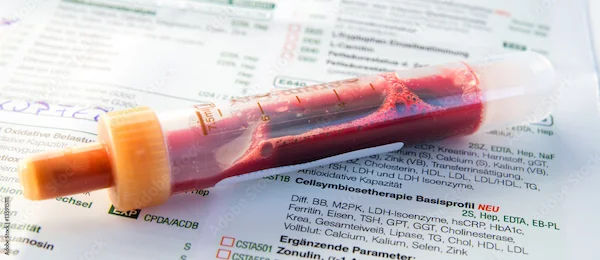How To Reduce HbA1c Level?
Discover effective ways to lower your HbA1c levels naturally through diet, exercise, and lifestyle changes. Learn how to manage blood sugar and improve long-term diabetes control.

Written by
Last updated on 3rd Jul, 2025
Managing your HbA1C levels is crucial for long-term health, especially if you have diabetes or prediabetes. High HbA1C levels can increase the risk of complications like heart disease, nerve damage, and kidney problems. With the right lifestyle changes and medical support, you can lower your HbA1C and improve your overall well-being.
What is HbA1C?
HbA1C (Haemoglobin A1C) is a blood test that measures your average blood sugar levels over the past 2-3 months. Unlike daily glucose tests, which show your sugar levels at a single point in time, HbA1C gives a broader picture of how well your blood sugar is controlled.
Ranges of HbA1c are as follows:
Normal HbA1C: Below 5.7%
Prediabetes: 5.7% to 6.4%
Diabetes: 6.5% or higher
If your HbA1C is high, it means your blood sugar has been elevated over time, and you may need to take steps to bring it down.
Why is Lowering HbA1C Important?
High HbA1C levels can lead to serious health complications, including:
Heart disease and stroke: High HbA1c increases the risk of cardiovascular complications.
Nerve damage (neuropathy): Elevated blood sugar can damage nerves over time.
Kidney disease: Poor glucose control can impair kidney function.
Vision problems (retinopathy): High HbA1c can harm the blood vessels in your eyes.
Slow wound healing: Excess sugar in the blood hinders the body’s natural healing process.
By reducing your HbA1C, you can lower these risks and improve your quality of life.
How to Lower HbA1C Naturally?
1. Eat a Balanced Diet
What you eat has a direct impact on your blood sugar levels. Follow these dietary tips:
Choose whole grains like brown rice, quinoa, whole wheat instead of refined carbs like white bread, pasta.
Increase fibre intake like vegetables, fruits, beans, and lentils to slow sugar absorption.
Limit sugary foods and drinks like sodas, candies, and desserts.
Include lean proteins like chicken, fish, and tofu and healthy fats like avocados, nuts, and olive oil.
Control portion sizes to avoid overeating.
2. Exercise Regularly
Physical activity helps your body use insulin better and lowers blood sugar. Aim for:
At least 150 minutes of moderate exercise like walking, cycling, or swimming per week.
Strength training twice a week, like lifting weights and using resistance bands, to improve insulin sensitivity.
3. Maintain a Healthy Weight
Losing even 5-10% of your body weight can significantly improve blood sugar control. Focus on gradual, sustainable weight loss through diet and exercise.
4. Stay Hydrated
Drinking enough water helps flush out excess sugar through urine. Avoid sugary drinks and opt for water, herbal teas, or infused water with lemon.
5. Get Enough Sleep
Poor sleep can affect insulin sensitivity and increase blood sugar levels. Aim for 7-9 hours of quality sleep each night.
6. Manage Stress
Stress hormones can raise blood sugar. Try relaxation techniques like:
Deep breathing exercises: Helps relax the nervous system and lower stress hormones.
Meditation or yoga: Promotes mindfulness and reduces cortisol levels.
Spending time in nature: Being outdoors can naturally ease stress and improve mood.
7. Monitor Blood Sugar Regularly
Check your blood sugar levels as advised by your doctor to track progress and adjust your plan if needed.
When to Seek Medical Help?
While lifestyle changes can help, some people may need medications like metformin or insulin to control HbA1C. Consult your doctor if:
Your HbA1C remains high despite lifestyle changes.
You experience frequent high or low blood sugar episodes.
You notice symptoms like extreme thirst, frequent urination, or fatigue.
Conclusion
Lowering your HbA1C takes time and commitment, but small, consistent changes can make a big difference. Focus on eating well, staying active, and working closely with your healthcare team. With the right approach, you can achieve better blood sugar control and live a healthier life.
Consult Top Diabetologist
Consult Top Diabetologist

Dr. Lakshmi Sanjitha Kakani
General Physician/ Internal Medicine Specialist
6 Years • MBBS, MD (General Medicine)
Visakhapatnam
Apollo 24|7 Clinic - Andhra Pradesh, Visakhapatnam

Dr. Lakshmi Sindhura Kakani
General Physician/ Internal Medicine Specialist
10 Years • MBBS, MD (General medicine)
Visakhapatnam
Apollo 24|7 Clinic - Andhra Pradesh, Visakhapatnam

Dr. Suraja Nutulapati
General Physician/ Internal Medicine Specialist
10 Years • MBBS, MD (Internal Medicine)
Hyderabad
Apollo 24|7 Clinic, Hyderabad
(850+ Patients)

Dr. Utsa Basu
Diabetologist
14 Years • MBBS, MD
Kolkata
Dr Utsa Basu Clinic, Kolkata
(375+ Patients)

Dr. Utsa Basu
Diabetologist
14 Years • MBBS , MD
Barasat
Diab-Eat-Ease, Barasat
(75+ Patients)
